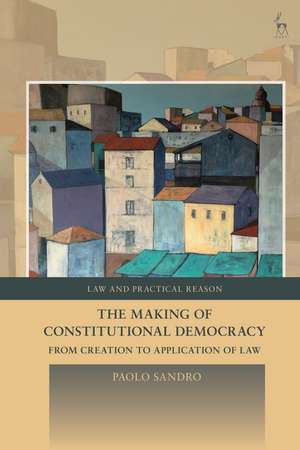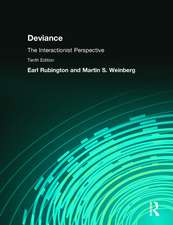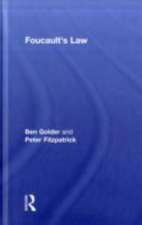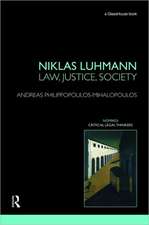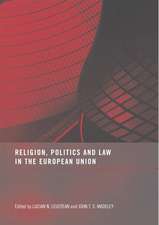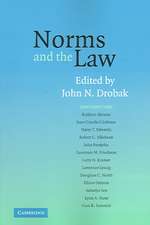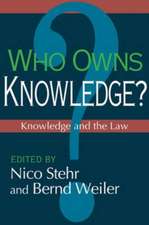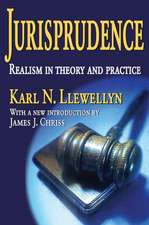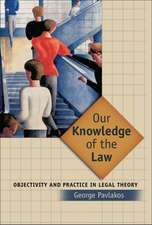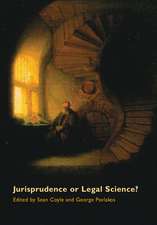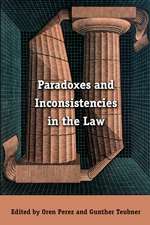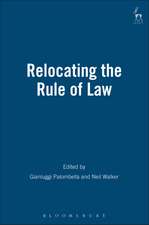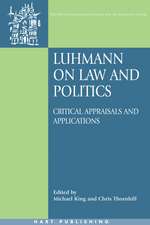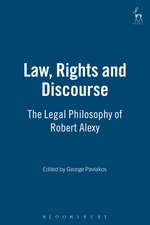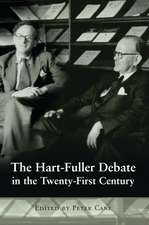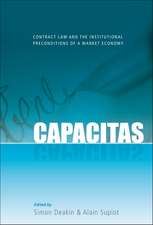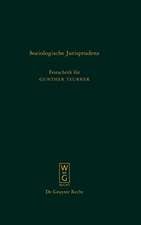The Making of Constitutional Democracy: From Creation to Application of Law: Law and Practical Reason
Autor Paolo Sandroen Limba Engleză Paperback – 26 iul 2023
| Toate formatele și edițiile | Preț | Express |
|---|---|---|
| Paperback (1) | 307.13 lei 6-8 săpt. | |
| Bloomsbury Publishing – 26 iul 2023 | 307.13 lei 6-8 săpt. | |
| Hardback (1) | 542.12 lei 6-8 săpt. | |
| Bloomsbury Publishing – 26 ian 2022 | 542.12 lei 6-8 săpt. |
Din seria Law and Practical Reason
- 30%
 Preț: 600.22 lei
Preț: 600.22 lei - 27%
 Preț: 376.93 lei
Preț: 376.93 lei - 21%
 Preț: 229.36 lei
Preț: 229.36 lei - 34%
 Preț: 509.38 lei
Preț: 509.38 lei - 34%
 Preț: 509.52 lei
Preț: 509.52 lei - 18%
 Preț: 358.50 lei
Preț: 358.50 lei - 22%
 Preț: 271.14 lei
Preț: 271.14 lei - 30%
 Preț: 571.66 lei
Preț: 571.66 lei - 30%
 Preț: 569.37 lei
Preț: 569.37 lei - 30%
 Preț: 597.63 lei
Preț: 597.63 lei - 22%
 Preț: 270.20 lei
Preț: 270.20 lei - 21%
 Preț: 216.62 lei
Preț: 216.62 lei - 30%
 Preț: 509.93 lei
Preț: 509.93 lei - 30%
 Preț: 569.60 lei
Preț: 569.60 lei - 23%
 Preț: 191.48 lei
Preț: 191.48 lei - 22%
 Preț: 251.83 lei
Preț: 251.83 lei - 21%
 Preț: 217.27 lei
Preț: 217.27 lei - 18%
 Preț: 308.07 lei
Preț: 308.07 lei - 30%
 Preț: 603.81 lei
Preț: 603.81 lei
Preț: 307.13 lei
Preț vechi: 374.63 lei
-18% Nou
Puncte Express: 461
Preț estimativ în valută:
58.78€ • 63.82$ • 49.37£
58.78€ • 63.82$ • 49.37£
Carte tipărită la comandă
Livrare economică 22 aprilie-06 mai
Preluare comenzi: 021 569.72.76
Specificații
ISBN-13: 9781509955213
ISBN-10: 1509955216
Pagini: 416
Dimensiuni: 156 x 234 x 25 mm
Greutate: 0.46 kg
Editura: Bloomsbury Publishing
Colecția Hart Publishing
Seria Law and Practical Reason
Locul publicării:London, United Kingdom
ISBN-10: 1509955216
Pagini: 416
Dimensiuni: 156 x 234 x 25 mm
Greutate: 0.46 kg
Editura: Bloomsbury Publishing
Colecția Hart Publishing
Seria Law and Practical Reason
Locul publicării:London, United Kingdom
Caracteristici
Demonstrates that the issue is fundamental to the justification of a legal order, the separation of powers and the rule of law
Notă biografică
Paolo Sandro is Lecturer in Law at the University of Leeds, UK.
Cuprins
I. Aims and Structure of the Work 1. Law, Power, and Political Authority. On the Scope and Limitations of the Work I. Introduction II. Brief Methodological Remarks III. The Province of the Problem Determined: What is Law? IV. Politics, Political Power, Political Authority V. From Powers to Power. The Familiar Tale of the Ineluctability of the State A. And its Two-pronged Critique: Isonomia and 'Early' States VI. The Conditions of Existence of Political Authority: Insights from the Theory of Normative Orders 2. The Dependence of Constitutional Democracy on the Distinction between Creation and Application of Law I. Introduction II. The Contested Relationship between Law and Politics III. Law as lex and as ius: The Duality that Makes Constitutionalism Possible IV. From Constitutions to Constitutionalism: Narrowing the Focus of Constitutional TheoryV. The (Proverbial) Tension between Democracy and Constitutionalism VI. Modern Constitutionalism as 'Legal Otherness' VII. The Two-fold Justificatory Dependence of Constitutional Democracy on the Idea of Application of Law 3. A Critical Evaluation of Moderate Legal Realism I. Introduction II. Realism vs Formalism III. Let Us be Realist about Adjudication. What do Judges Eat for Breakfast? IV. Realism and Realisms in Law: Meta-theory V. The Lowest Common Denominator of Legal Realism VI. The Two Axes of Rule-scepticism A. Radical-immanent Indeterminacy Thesis B. Radical-transcendental Indeterminacy Thesis C. Moderate-immanent Indeterminacy Thesis D. Moderate-transcendental Indeterminacy Thesis VII. The Unbearable Lightness of Moderate Scepticism 0VIII. On the Normativity of Law, and On the Digestion of Judges 4. Towards a Unified Account of Discretion in Law I. Introduction II. HLA Hart and the Concept of Discretion. Back to the Future? III. Dworkin and the (Normative) No-Strong-Discretion Thesis IV. Discretion as a Pervasive Feature of Kelsen's Stufenbaulehre V. Discretion as Balancing in Klatt (and Alexy) VI. The History of Discretion in the Administrative Domain VII. Administrative Discretion in Germany VIII. Discretion in the French-Italian Administrative TraditionIX. The Concept of Discretion in English Administrative Law X. Towards a Unifi ed Account of Discretion in Law A. Normative Discretion B. Interpretive Discretion XI. Conclusion 5. Law and Language and as Language. An Alternative Picture of a Multifaceted Relationship I. Introduction II. The Communicative Model of Law. A Two-way Affair? III. Beyond 'What is Said'. Speech-act Theory and the Rise of Pragmatics in Legal Interpretation IV. First Objection: Law as Language, Law and Language(s) V. Second Objection: Speech-act vs Text-act Theory VI. Legal Texts as 'Autonomous' Text-acts VII. An Alternative Theory of Legal Meaning: Semantic Minimalism VIII. Prolegomena to a Theory of Legal Interpretation IX. Conclusion 6. Creation and Application of Law. An Analytical DistinctionI. Introduction II. The Two Extremes: Rejecting vs Assuming the Distinction III. Kelsen on the Relativity of the Distinction between Creation and Application of Law IV. Creation of Law: Of the Typicality of Legal Rules V. The Principle of Legality as a (Semantic) Meta-norm on Law-creation and Law-application VI. Unpacking the Idea of 'Application of Law' VII. The Potential Asymmetry between Norm-following and Norm-applicationVIII. On the (Different) Normativity of Power-conferring Norms IX. Can only Officials Apply the Law? X. Form and Substance. Towards an Analytical Account of Law-application XI. Conclusion XII. PS One Final Objection: Interpretation, Interpretation, Interpretation! 7. The Separation of Powers. A Meta-theoretical Reassessment I. Introduction II. Genealogical Issues. When was the Separation of Powers 'Invented'? III. A Twofold Meta-theoretical Ambiguity Plaguing the Discussion IV. The Justificatory Debate. Monism vs Pluralism V. Critical Approaches VI. The Separation of Powers as a Formal Theory and as a Normative Doctrine. On the Advantages of Maintaining a Strict Distinction A. The Formal Theory of the Separation or Division of Powers B. A Normative Doctrine of the Organisation of Political Power Based on the Distinction between Law-creationand Law-application VII. Conclusion
Recenzii
The Making of Constitutional Democracy is a rich and sophisticated book. Its bibliographical apparatus is simply breathtaking. The depth of Sandro's engagement with multiple areas of legal theory is remarkable . Sandro engages with constitutional theory, analytical jurisprudence, administrative law, and the philosophy of language with ease and rigor.
The book is a real learning experience. If you have accepted some of mainstream legal or political thinking, get ready to have several of your received ideas challenged on a sophisticated level . the book is a worthwhile addition to the literature on a number of key topics in legal theory and democratic theory.
Packed with interesting ideas.
[This] book ... tackles, with analytical clarity and rigour, an issue that is central to today's jurisprudential debates: the distinction between law-creation and law-application ... Paolo Sandro puts forward a considerable series of arguments, many of them highly original (and, to my mind, conclusive), that ground the epistemological difference between these two activities and justify their division. His work constitutes, therefore, a major contribution to a fundamental issue: not just in philosophy of law, but in the theory of constitutional democracy as well.
The book is excellently-sourced, always well-argued, and makes a case for a revival of philosophical interest in some fundamental truisms of legal and political theory: we can no longer assume to understand central concepts such as law-making, separation of powers, discretion, and application of law ... The book is also an exercise in transdisciplinary jurisprudence: here legal theory is in constant dialogue with the empirical findings in other areas of law and beyond. Sandro's work is relevant, insightful and interesting.
Paolo Sandro ... appears to have read everything - and I do mean everything - in legal philosophy, political theory, and the philosophy of language. His book is not, however, a compendium of the views of others. It is, rather, chock full of original and innovative arguments, brought together in a spacious book of uncommon appeal.
How does the distinction between creation and application of law bear upon the legitimacy of our constitutional democracies? Bringing the realist's quandary about the indeterminacy of law to an examination of the conceptual and institutional features of constitutional democracy, Paolo Sandro's unfailingly erudite yet remarkably accessible book literally has something for everyone in its answer to that question. Its wide-ranging, historically sensitive, and bridge-building analysis makes a compelling case for why a distinction upon which so many assumptions and practices of democratic constitutionalism turn demands a closer look.
Paolo Sandro ties together the role of law from its creation through its application to the ideals of constitutionalism and democracy. He systematically breaks down the role of law through a systematic approach that shows the breadth of the topic, while also expanding upon many of the elements necessary for constitutional democracy.
The book is a real learning experience. If you have accepted some of mainstream legal or political thinking, get ready to have several of your received ideas challenged on a sophisticated level . the book is a worthwhile addition to the literature on a number of key topics in legal theory and democratic theory.
Packed with interesting ideas.
[This] book ... tackles, with analytical clarity and rigour, an issue that is central to today's jurisprudential debates: the distinction between law-creation and law-application ... Paolo Sandro puts forward a considerable series of arguments, many of them highly original (and, to my mind, conclusive), that ground the epistemological difference between these two activities and justify their division. His work constitutes, therefore, a major contribution to a fundamental issue: not just in philosophy of law, but in the theory of constitutional democracy as well.
The book is excellently-sourced, always well-argued, and makes a case for a revival of philosophical interest in some fundamental truisms of legal and political theory: we can no longer assume to understand central concepts such as law-making, separation of powers, discretion, and application of law ... The book is also an exercise in transdisciplinary jurisprudence: here legal theory is in constant dialogue with the empirical findings in other areas of law and beyond. Sandro's work is relevant, insightful and interesting.
Paolo Sandro ... appears to have read everything - and I do mean everything - in legal philosophy, political theory, and the philosophy of language. His book is not, however, a compendium of the views of others. It is, rather, chock full of original and innovative arguments, brought together in a spacious book of uncommon appeal.
How does the distinction between creation and application of law bear upon the legitimacy of our constitutional democracies? Bringing the realist's quandary about the indeterminacy of law to an examination of the conceptual and institutional features of constitutional democracy, Paolo Sandro's unfailingly erudite yet remarkably accessible book literally has something for everyone in its answer to that question. Its wide-ranging, historically sensitive, and bridge-building analysis makes a compelling case for why a distinction upon which so many assumptions and practices of democratic constitutionalism turn demands a closer look.
Paolo Sandro ties together the role of law from its creation through its application to the ideals of constitutionalism and democracy. He systematically breaks down the role of law through a systematic approach that shows the breadth of the topic, while also expanding upon many of the elements necessary for constitutional democracy.
